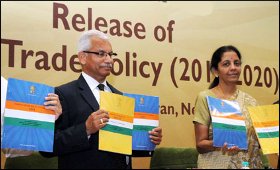|

|
A forward looking foreign trade policy
|
|

|
|
| Top Stories |
 |
|
|
|
Bikky Khosla | 07 Apr, 2015
Finally, after a long wait, the Centre released the Foreign Trade Policy for the term 2015-2020 and it was well worth the wait. The document is characterized by freshness in approach and I find no dearth of reasons to cheer this superbly drafted document. First of all its focus on improving the ease of doing business - an issue we have discussed earlier time and again on this very platform - sparks a ray of hope. In addition, the clear road map it has laid down for exports for the coming years also deserves praise.
In the very first chapter of the document, it is mentioned that trade facilitation is a priority of the government. It tells about cutting down the time and transaction costs required in exports by moving towards digitization and paperless working in a 24 X 7 environment. Several clear measures are proposed to achieve this objective and if this policy works as envisaged, the burden of time, costs and documentation will certainly come down significantly for our exporters.
The effort to streamline the process of export incentives is also laudable. Now, under the Merchandize Exports from India Scheme, which replaces five different schemes, the benefits will range 2- 5 % against 2- 7% earlier and under the Service Exports from India Scheme, the benefits will come down to 3- 5% against 5-10% earlier, but while sops have been reduced, they are now more in line with WTO rules. With our economy growing and per capita income increasing, we may soon lose our entitlement to export sops. The FTP, therefore, rightly, wants our exporters to get prepared to run on competitive advantage instead of expecting tariff sops to come their way.
The FTP aims at integrating our export strategy with the flagship 'Make in India' programme. It seeks to promote indigenous capital goods production by reducing Export Obligation for domestic procurement under EPCG scheme. In case of capital goods procured from indigenous manufacturers Specific Export Obligation has been reduced to 75% from 90% earlier. Also, it is proposed to give a higher level of rewards to products with high domestic content and value addition.
Meanwhile, it has been reported the government is set to reintroduce the interest subvention scheme, which lapsed in April last year, soon for some labour intensive sectors. This is a good piece of news as the scheme has proved very beneficial for the small and medium enterprises engaged in exports. In the Budget 2015-16, an allocation of Rs 1,650 has been made and as the global demand is softening, I think no further delay should be made in relaunching this scheme.
I invite your opinions.
|
|
|
| |
|
|
|
|
|
|
|
FTP
M B S AGARWAL | Thu Apr 9 03:41:23 2015
The export of service seems one big thrust area. But the Service Tax Rules and the Service Tax Act are not aligned for export of services. The point of Service definition means that if service is provided to overseas customer by a service provider in India, the services will be taxed under service tax if the service is performed in India. e.g. Many software companies from USA and UK deal in special software which are used in India. For assisting these customers, the foreign company appoints consultants in India ( local citizens) to help clients in India to use these software. The local consultant in India gets his fees in convertible foreign currency. But this fees is subject to levy of service tax . This deters many technocrats to work in India and try find alternate routes to circumvent the levy. It would be worthwhile to amend laws that no service tax is levied if service charges are received in convertible currency irrespective of point of service. The piecemeal amendments in Service Tax Rules and Act have made export of services cumbersome. If full exploitation of opportunities is required then words in FTP must walk in the revenue laws. Another issue is including reimbursement expenses in total cost of service provided for levy of service tax. So all travelling , boarding, lodging costs reimbursed to service providers will be subject to levy of service tax. FTP goes one step forward and revenue laws bring 2 steps backward!

cutting down costs
Srivathsan.R. | Wed Apr 8 16:34:58 2015
Cutting down costs is very important either domestic or foreign more so in exports since we have compete with international productivity. The export houses must proactively engage in increasing the productivity of their suppliers along with their service providers and also delay in govt agencies who are least concerned about delay. Take the case of trucks loaded with material waiting outside big industries for days together to get them unloaded. None of the employees bother about this national wastage since it does not concern them directly. similarly there are umpteen number of activities which need to be galvanism for higher productivity..

|
|
|
|
|
|
|
| |
| Customs Exchange Rates |
| Currency |
Import |
Export |
US Dollar
|
84.35
|
82.60 |
UK Pound
|
106.35
|
102.90 |
Euro
|
92.50
|
89.35 |
| Japanese
Yen |
55.05 |
53.40 |
| As on 12 Oct, 2024 |
|
|
| Daily Poll |
 |
 |
| Do you think Indian businesses will be negatively affected by Trump's America First Policy? |
|
|
|
|
|
| Commented Stories |
 |
|
|
|
|
|
| |
|